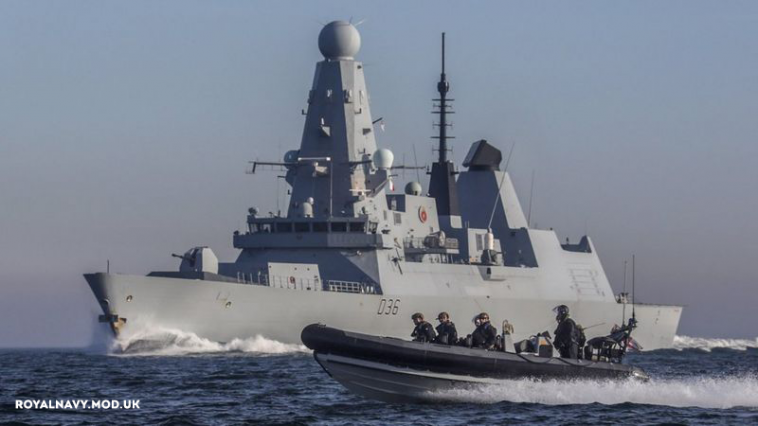On June 23, the British destroyer Defender became a platform for joint training of special operations forces of Ukraine, the UK and the USA in the Black Sea. According to the Ministry of Defense of Ukraine, the consolidated boarding team of special operations (on the Ukrainian side – the 73rd Naval Center of Special Operations named after Koshovyi Otaman Anton Holovatyi) practised boarding operations.
BBC correspondent Jonathan Beale was on board the British destroyer HMS Defender, against which, according to the Russian Federation, warning shots were fired near Crimea on Wednesday, and described the incident in the Black Sea. Here is a summary based on BBC reports of what exactly happened and what it means for the situation in the Black Sea.
What happened? On June 23, the Russian Defense Ministry said the British warship HMS Defender (D36) fired warning shots close to the annexed Crimea. The Russian military claim that after radio calls to change course, several warning shots were fired in the direction of the British ship, and air bombs were dropped on its course.
The British Defense Ministry denied this – they say that their ship sailed peacefully through the territorial waters of Ukraine in the direction of Georgia, and some Russian exercises were going on nearby.
However, BBC correspondent Jonathan Beale, who was on board HMS Defender, said that the British ship really heard “some firing in the distance”, and sailors were on the ground in full combat readiness and even in protective masks in case of shelling and fire.
Meanwhile, the Russians did not dare to open fire for effect. Despite the reports that they had fired and dropped four warning bombs, there was actually no shelling or seizure of the ship – no one tried to climb on the destroyer and take control of it.
Nevertheless, although the Russians did not dare to use force, they responded- there were ships of the FSB Coast Guard, and up to 20 aircraft, which can be seen in the video of the Russian Defense Ministry.
Part of NATO’s strategy and the Global Britain strategy. Mykola Beleskov, chief consultant at the National Institute for Strategic Studies, told the BBC that the passage of the ship complied with NATO’s policy of systematically sending ships to the Black Sea.
“This is part of NATO’s overall plan approved in 2019 after the incident near the Kerch Strait: they must increase the presence of their ships in the Black Sea to preserve the freedom of navigation and deter Russia,” he said.
“The passage of Defender is also part of the Global Britain strategy, according to all documents published in March this year.
This strategy suggests that Britain will play an active role and be present in regions that are actually a front of struggle between democratic and authoritarian states. So NATO member states’ policy and purely British policy are intertwined here,” he said.
Maksym Shepovalenko, Deputy Director of the Russian Center for Analysis of Strategies and Technologies, Captain 2nd Rank in Reserve (Moscow) also confirms this opinion. “Everything happened clearly in the context of the new British military doctrine “Defense in a Competitive Age” adopted three months ago.
“It’s about the navy as a tool for globalizing Britain’s military presence, rivalry in the “gray” zone (in “no peace no war” situation), and support for allies in different parts of the world, including Ukraine,” Shepovalenko explains in his comment to the BBC.
Why is this important for Ukraine? Such demonstrations are good For Ukraine, but it is much more important that NATO and the United States be more present in the Black Sea, almost permanently. This is what can change the situation in the region. This opinion was expressed by Mykola Beleskov, chief consultant of the National Institute for Strategic Studies, in a comment to the BBC,
“The demonstration is more about non-recognition of the occupation of Crimea, which is also needed. But the main thing for Ukraine is the freedom of navigation in the Black Sea as such. And this requires the presence of NATO and the United States, which decreased last year compared to 2019.
For Kyiv, for example, it would be important to have an agreement with NATO and the United States for them to enter the Black Sea every month. Because now it happens intermittently.
The Russians in general feel more and more confident here, because the militarization of Crimea continues, a group has already been created there. It has the appropriate potential,” the expert commented.
Andrii Klymenko, head of the Maidan of Foreign Affairs monitoring group, editor-in-chief of the http://www.blackseanews.net/, in his comment to the BBC also stressed the importance of this maneuver for Ukraine. “Firstly, by transit through this section of territorial waters near Sevastopol the British have shown that they do not recognize the occupation of Crimea through their practical actions rather than ‘concerns’.
Secondly, I know that expert and military circles interpret this incident as a message from the British Navy that it is there to support us.
And thirdly, it concerns the situation in the Arctic and Baltic regions, where Russia is trying to carry out a “creeping occupation,” or China’s actions in the South China Sea. The British destroyer showed with its passage that Britaincares for freedom of navigation and maritime conventions,” he said.

